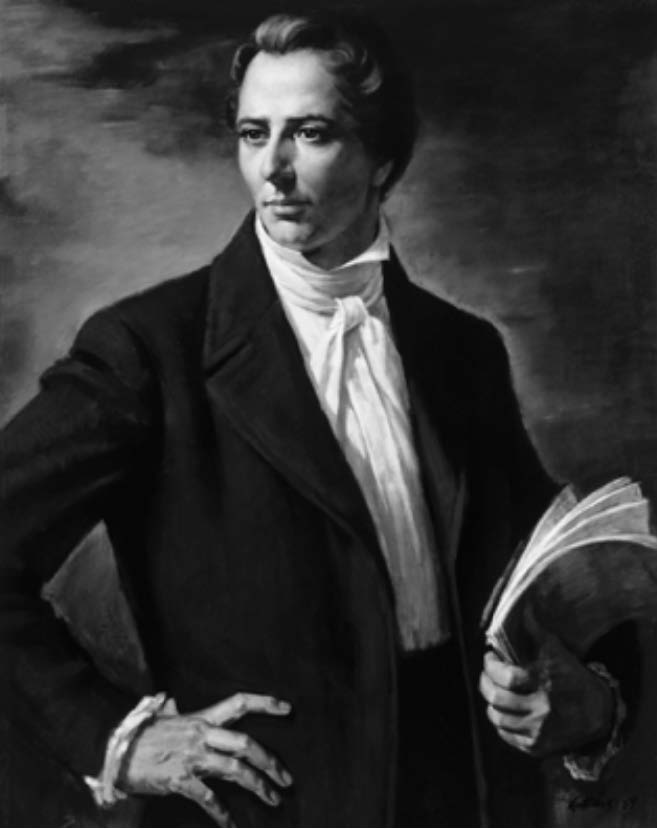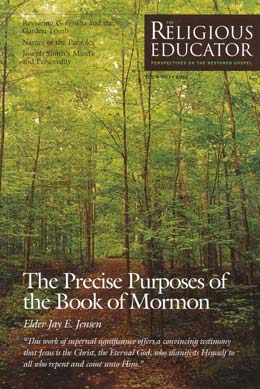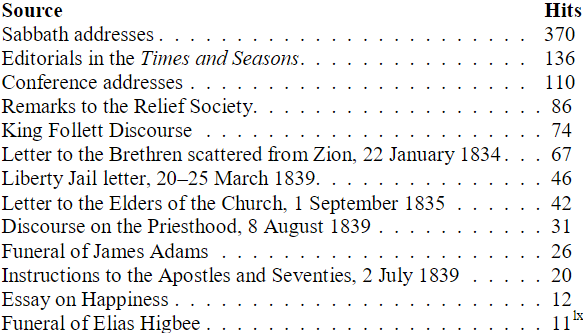Insights into the Mind and Personality of the Prophet Joseph Smith
Donald Q. Cannon
Donald Q. Cannon, “Insights into the Mind and Personality of the Prophet Joseph Smith,” Religious Educator 4, no. 1 (2003): 79–86.
Donald Q. Cannon was a professor of Church history and doctrine at BYU when this was published.
 Joseph Smith by Alvin Gittins, 1959. © by Intellectual Reserve, Inc. Used by permission.
Joseph Smith by Alvin Gittins, 1959. © by Intellectual Reserve, Inc. Used by permission.
Several years ago, Larry Dahl and I discussed the possibility of preparing a new version of Joseph Smith’s teachings and arranging them by topic. Essentially, we planned to make a book available that would provide information on “what Joseph Smith said about what”—that is, a topical approach.
We set to work and over a period of about three years created a manuscript that was first published in 1997 under the title The Teachings of Joseph Smith. It was later published as the Encyclopedia of Joseph Smith’s Teachings. During the course of our research, I learned a lot about the Prophet Joseph Smith. The research process afforded a more detailed and intimate view of the Prophet than I ever thought possible.
Concerning sources, I was surprised to learn that the single best place to look for Joseph Smith’s teachings is a readily available publication—namely, the History of the Church.[1] Although many other sources are available, such as The Personal Writings of Joseph Smith,[2] The Papers of Joseph Smith,[3] The Concordance of Doctrinal Statements of Joseph Smith,[4] Discourses of the Prophet Joseph Smith,[5] Teachings of Joseph Smith,[6] Scriptural Teachings of Joseph Smith,[7] The Words of Joseph Smith,[8] The Wisdom of Joseph Smith,[9] as well as the manuscript sources in the Church Archives, I found that the History of the Church is the single most valuable source of information concerning Joseph Smith.
As we searched, we discovered that certain types of materials came up again and again. Joseph Smith’s Sunday addresses furnished the most entries for our book. The next most frequent entries were his editorials in the Times and Seasons. As this process went on, we asked our research assistant, Robert Bond, to perform a computer analysis of the various types of materials and the frequency of their usage. The results of that analysis are found in the introduction to our book, and they are also reproduced here:
The fact that Joseph Smith was speaking to the Saints quite regularly on Sunday is also of interest because, in the early part of his career as President of the Church, Joseph spoke only rarely. By the time he was in Nauvoo, he spoke frequently, not only on Sunday but in general conferences and other meetings.
What did Joseph Smith speak about in these settings? We decided to employ a computer analysis on the subjects covered, as we had done on the various types of sources. The results of that analysis are found below:
Topic Hits
Revelation . . . . . . . . . . . . . . . . . . . . . . . . . . . . . . . . . . . . . . . . . . .49
Abraham, Book of. . . . . . . . . . . . . . . . . . . . . . . . . . . . . . . . . . . . . 39
Obedience . . . . . . . . . . . . . . . . . . . . . . . . . . . . . . . . . . . . . . . . . . 28
Truth. . . . . . . . . . . . . . . . . . . . . . . . . . . . . . . . . . . . . . . . . . . . . . . 26
Devil. . . . . . . . . . . . . . . . . . . . . . . . . . . . . . . . . . . . . . . . . . . . . . . 25
Charity. . . . . . . . . . . . . . . . . . . . . . . . . . . . . . . . . . . . . . . . . . . . . 24
God . . . . . . . . . . . . . . . . . . . . . . . . . . . . . . . . . . . . . . . . . . . . . . . .23
Jesus Christ . . . . . . . . . . . . . . . . . . . . . . . . . . . . . . . . . . . . . . . . . .23
Knowledge . . . . . . . . . . . . . . . . . . . . . . . . . . . . . . . . . . . . . . . . . . .23
Holy Ghost . . . . . . . . . . . . . . . . . . . . . . . . . . . . . . . . . . . . . . . . . . 22
Zion . . . . . . . . . . . . . . . . . . . . . . . . . . . . . . . . . . . . . . . . . . . . . . . .22[11]
This analysis of topics is, of course, not a complete list but is simply a listing of the main ideas he presented.
I found it especially fascinating that the Prophet Joseph taught most about the subject of revelation. Since the whole work of the Restoration is centered on the concept of revelation, this is entirely fitting and appropriate.
I learned that revelation can be withheld from us because of our own improper conduct; Joseph taught covetousness can seal the heavens and prevent revelations from coming from the Lord.[12] He also taught that God tailors revelations to the needs of a given generation.[13] This notion goes to the heart of why current revelation is so essential. Concerning the purity of revelation, he said, “Spring water tastes best right from the fountain.”[14] I learned, then, that revelation was a common experience for Joseph Smith and that he had an excellent understanding of that source of truth.
The Prophet Joseph Smith had a marvelous understanding of the principle of obedience. He taught, for example, about rewards for obedience when he said, “Live in strict obedience to the commandments of God, and walk humbly before Him, and He will exalt thee in his own due time.”[15] Also, he said that “in obedience there is joy and peace.”[16]
Sometimes I have been quite amazed at the subjects that were not discussed by Joseph Smith. In our collection of teachings, there were no entries under the Sabbath. This is not to say that the Prophet never mentioned the Sabbath but simply that other subjects were of greater concern to him.
Through my study of the teachings of Joseph Smith, I learned something about Joseph as a man—the human dimension. For one thing, I learned that Joseph had a sense of humor. He employed humor in his teaching because he understood that humor is helpful in reaching one’s audience. Some examples of his humor are the following:
You might as well baptize a bag of sand as a man, if not done in view of the remission of sins.[17]
There are so many fools in the world for the devil to operate upon, it gives him the advantage oftentimes.[18]
If we go to hell, we will turn the devils out of doors and make a heaven of it.[19]
All ye lawyers who have no business, only as you hatch it up, would to God you would go to work or run away.[20]
It is best to let Sharp[21] publish what he pleases and go to the devil, and the more lies he prints the sooner he will get through.[22]
Mr. Sollars stated that James Mullone, of Springfield, told him as follows:—”I have been to Nauvoo, and seen Joe Smith, the Prophet: he had a gray horse, and I asked him where he got it; and Joe said, ‘You see that white cloud.’ ‘Yes.’ ‘Well, as it came along, I got the horse from that cloud.’”[23]
When a man undertakes to ride me I am apt to kick him off and ride him.[24]
I have said more than I ever did before, except once at Ramus, and then up starts the little fellow (Charles Thompson) and stuffed me like a cock-turkey with the prophecies of Daniel, and crammed it down my throat with his finger.[25]
In addition to using humor, Joseph Smith tried to incorporate colorful expressions that people could relate to and understand. He wanted to talk their language to help them comprehend his message. Here are some examples:
I tried to prevail upon him, making use of the figure, supposing that he should get into a mud-hole, would he not try to help himself out? And I further said that we were willing now to help him out of the mud-hole. He replied, that provided he had got into a mud-hole through carelessness, he would rather wait and get out himself, than to have others help him.[26]
A little tale will set the world on fire.[27]
Hit pigeons always flutter.[28]
As I studied these research materials on Joseph Smith, it became evident that he was a patriot in the best sense of the word. He frequently expressed his loyalty to the United States of America and often praised the government and especially the Constitution. Once, while pointing out some problems in that time, he nevertheless concluded, “With all our evils we are better situated than any other nation.”[29] His patriotic feelings are further expressed in these examples:
The Constitution . . . is a glorious standard; it is founded in the wisdom of God. It is a heavenly banner.[30]
I am the greatest advocate of the Constitution of the United States.[31]
Joseph Smith believed that women had an important contribution to make to the building of the kingdom. He said that the Church was not fully organized until the women were organized. In his view, women had qualities and traits that were commendable, desirable, and useful. He taught:
Our women have always been signalized for their acts of benevolence and kindness.[32]
It is natural for females to have feelings of charity and benevolence.[33]
The Prophet viewed wives as being qualified to help their husbands and also make them better men. He believed that a good wife could encourage a man to make the best choices and pursue the most desirable path.
Feelings of charity came easily and naturally to Joseph Smith. As he taught:
Love is one of the chief characteristics of Deity, and ought to be manifested by those who aspire to be the sons of God. A man filled with the love of God, is not content with blessing his family alone, but ranges through the whole world, anxious to bless the whole human race.[34]
I frequently rebuke and admonish my brethren, and that because I love them.[35]
There is a love from God that should be exercised toward those of our faith, who walk uprightly, which is peculiar to itself, but it is without prejudice; it also gives scope to the mind, which enables us to conduct ourselves with greater liberality towards all that are not of our faith, than what they exercise towards one another. These principles approximate nearer to the mind of God, because it is like God, or Godlike.[36]
I have no enmity against any man. I love you all; but I hate some of your deeds.[37]
My heart is large enough for all men.[38]
Joseph Smith sincerely believed that he had a special mandate to set things right in matters of religion. He had an overwhelming desire to correct false doctrine and proclaim the truths that God had revealed to him. This was his mission and his purpose as a prophet of God—a theme that runs through much of his teaching. In fact, there are at least thirty separate settings in which the Prophet discussed his mission as a proclaimer of precious truth to a world that had lost it. Rather than list all of these statements or repeat them, I have chosen to present four that best illustrate this point:
The object . . . is to obey and teach others to obey God in just what He tells us to do. It mattereth not whether the Principle is popular or unpopular, I will always maintain a true principle, even if I stand alone in it.[39]
It is my duty to teach the doctrine. I would teach it more fully—the spirit is willing, but the flesh is weak. God is not willing to let me gratify you; but I must teach the Elders, and they should teach you.[40]
The whole earth shall bear me witness that I, like the towering rock in the midst of the ocean, which has withstood the mighty surges of the warring waves for centuries, am impregnable, and am a faithful friend to virtue, and a fearless foe to vice,—no odds whether the former was sold as a pearl in Asia or hid as a gem in America, and the latter dazzles in palaces or glimmers among the tombs.
I combat the errors of ages; I meet the violence of mobs; I cope with illegal proceedings from executive authority; I cut the Gordian knot of powers, and I solve mathematical problems of universities, with truth—diamond truth; and God is my right hand man.[41]
I stood alone, an unlearned youth, to combat the worldly wisdom and multiplied ignorance of eighteen centuries, with a new revelation, which (if they would receive the everlasting Gospel,) would open the eyes of more than eight hundred millions of people, and make “plain the old paths,” wherein if a man walk in all the ordinances of God blameless, he shall inherit eternal life.[42]
Putting together a book on Joseph Smith’s teachings has been a truly wonderful experience. This encounter with Joseph’s ideas has deepened my understanding and strengthened my testimony of him. I trust that those who read this book and use it in their study will likewise benefit and be strengthened. Engaging in this project has reinforced my own personal conviction that Joseph Smith was indeed a true prophet. He was actually what he so boldly proclaimed. The range of his teachings and the inherent wisdom and power of his ideas testify of his divine calling.
Notes
[1] Joseph Smith, History of the Church of Jesus Christ of Latter-day Saints, ed. B. H. Roberts, 2d ed., rev. (Salt Lake City: Deseret Book, 1964).
[2] Joseph Smith, Personal Writings of Joseph Smith, comp. and ed. Dean C. Jessee (Salt Lake City: Deseret Book, 2002).
[3] Joseph Smith, The Papers of Joseph Smith, ed. Dean C. Jessee, 2 vols. (Salt Lake City: Deseret Book, 1992).
[4] Joseph Smith, Concordance of Doctrinal Statements of Joseph Smith, ed. Truman G. Madsen (Salt Lake City: I.E.S. Publishing, 1985).
[5] Joseph Smith, Discourses of the Prophet Joseph Smith, comp. Alma P. Burton, 3d ed., rev. (Salt Lake City: Deseret Book, 1965).
[6] Joseph Smith, Teachings of the Prophet Joseph Smith, comp. Joseph Fielding Smith (Salt Lake City: Deseret Book, 1974).
[7] Joseph Smith, Scriptural Teachings of the Prophet Joseph Smith, comp. Joseph Fielding Smith, annotated by Richard C. Galbraith (Salt Lake City: Deseret Book, 1993).
[8] Joseph Smith, The Words of Joseph Smith, comp. and ed. Andrew F. Ehat and Lyndon W. Cook (Provo, Utah: Religious Studies Center, Brigham Young University, 1980).
[9] Joseph Smith, The Wisdom of Joseph Smith, comp. Donald Q. Cannon (Orem, Utah: Grandin Book, 1983).
[10] Based on Joseph Smith, Encyclopedia of Joseph Smith’s Teachings, ed. Larry E. Dahl and Donald Q. Cannon (Salt Lake City: Deseret Book, 2000), viii.
[11] Encyclopedia, ix.
[12] Encyclopedia, 564.
[13] Encyclopedia, 568.
[14] Encyclopedia, 574.
[15] Encyclopedia, 448.
[16] Encyclopedia, 452.
[17] Encyclopedia, 67.
[18] Encyclopedia, 188.
[19] Encyclopedia, 319–20.
[20] Encyclopedia, 393.
[21] Thomas Sharp was the caustic editor of the Warsaw Signal, a newspaper opposed to Joseph Smith and the Church and Nauvoo.
[22] Encyclopedia, 396.
[23] Encyclopedia, 396.
[24] Words, 178. To include more examples of his humor, we had to go outside our book and draw from other sources. Some of these statements were not deemed appropriate for inclusion in our teachings book.
[25] History of the Church, 5:345.
[26] Encyclopedia, 277.
[27] Encyclopedia, 303.
[28] History of the Church, 6:170.
[29] Encyclopedia, 688.
[30] Encyclopedia, 143–44.
[31] Encyclopedia, 144.
[32] Encyclopedia, 108.
[33] Encyclopedia, 108.
[34] Encyclopedia, 107.
[35] Encyclopedia, 404.
[36] Encyclopedia, 404.
[37] Encyclopedia, 111.
[38] Encyclopedia, 111.
[39] Encyclopedia, 653.
[40] Encyclopedia, 654.
[41] Encyclopedia, 698.
[42] Encyclopedia, 717.

